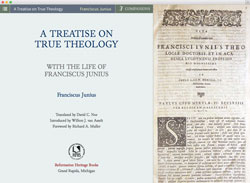This Spring we have an exciting array of scholars that are scheduled to speak in a variety of venues. We hope you will be able to join us either in person or online. Also, I wanted to take a moment to remind you and encourage you to consider a few things. Through our Colloquium series, since August 2015, we have had opportunity in person and online to present to about 2,500 attendees and viewers globally. That is simultaneously encouraging and daunting. It is tremendously encouraging because, as you may or may not know, the Junius Institute is fueled and funded overwhelmingly and primarily by the ardor, love, and zeal of its volunteers. These selfless volunteers have devoted their gifts, time, and effort to make this possible for the public good of a global audience of students, scholars, pastors, and the interested general public. It is daunting because as our reach has grown, our support has not kept pace. We are asking for your timely assistance. Please donate either by a one time gift or regularly. Your support builds people. Your support builds students, scholars, and pastors, globally. Your support makes the colloquium series into a rich conversation with scholars globally and helps academies, seminaries, and even churches. Your gift of whatever size helps us defray travel costs, meals, lodging, multimedia presentations, and so forth. It also reaches people. It keeps our projects and presentations free. That’s right, free to the public. So if you can give, please do, it helps scholars travel, eat, sleep, and speak. It helps students learn and scholars as well as pastors reflect. We also delight in providing a platform for students, new scholars, and established scholars to speak. I have the pleasure of receiving notes and e-mails from you–our viewers–from time to time thanking us for the content and the conversation. Your encouragement both in word and gift is necessary: it helps us keep going in so many ways.
Without any more adieu it is my pleasure to let you know about the colloquium schedule for the remainder of the Spring. The links below are to our presentations that have either already occurred or soon will.
I look forward to seeing you either here in Grand Rapids or online, and thank you for your support,
Todd Rester, Director



